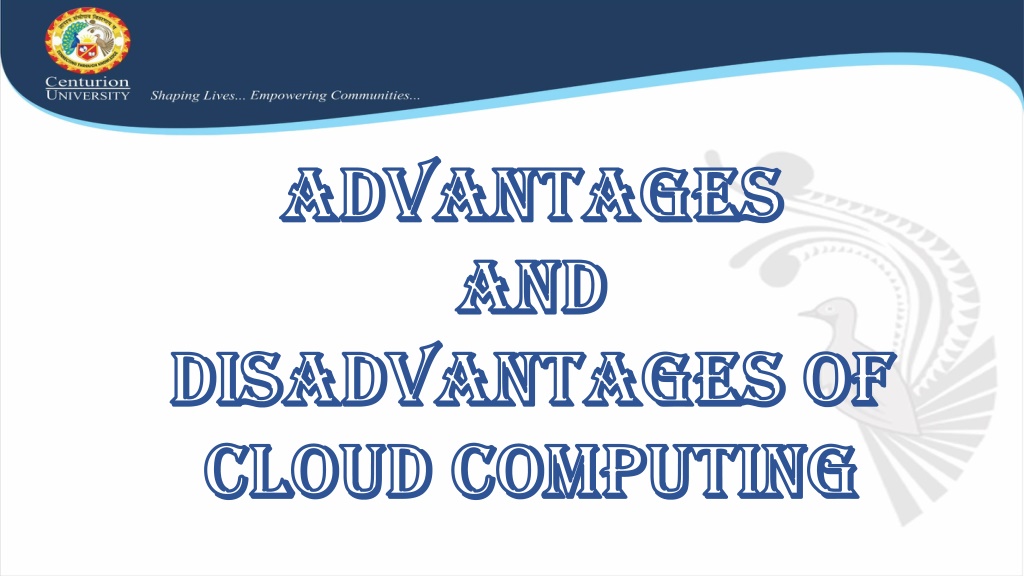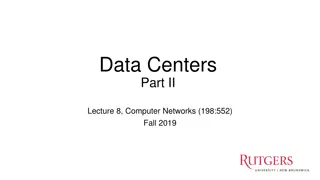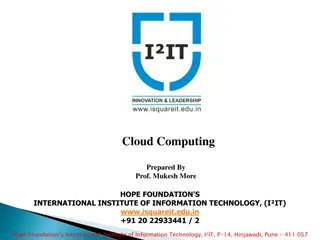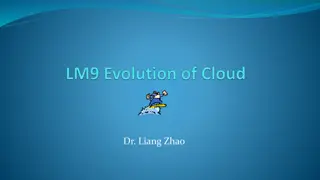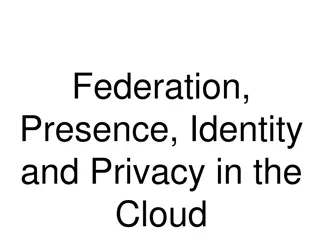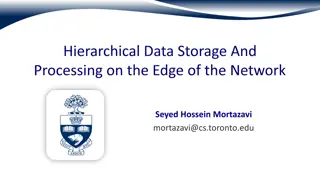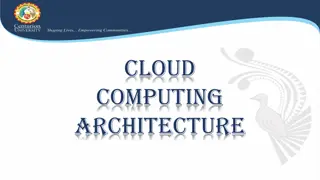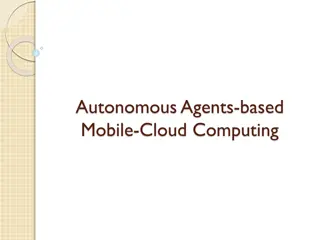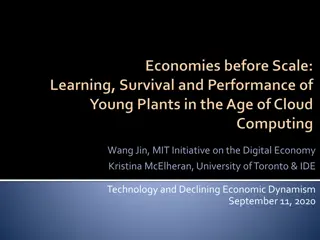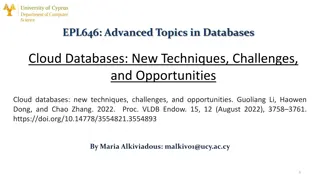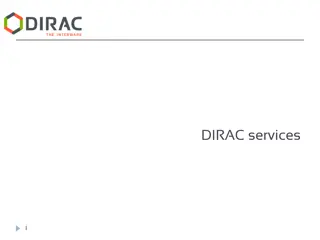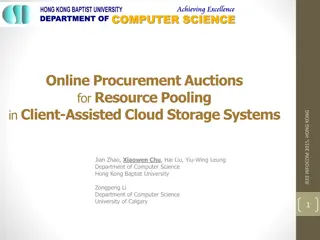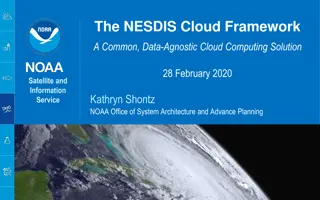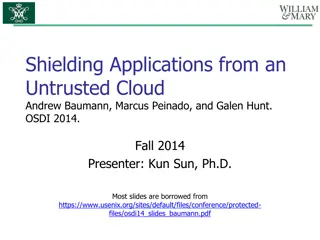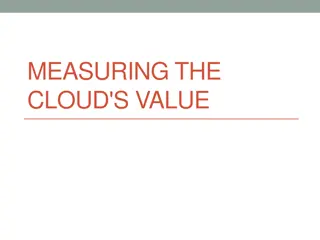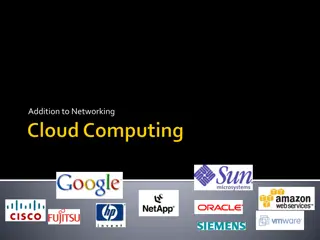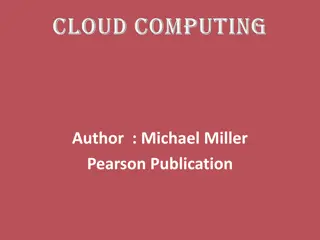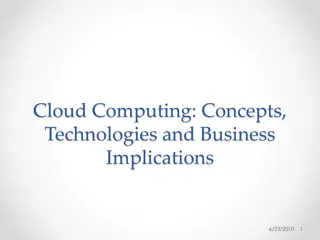Advantages and Disadvantages of Cloud Computing Explained
Cloud computing offers advantages such as easy data backup, improved collaboration, accessibility, low maintenance costs, mobility, pay-per-use services, unlimited storage capacity, and enhanced data security. However, it has disadvantages like reliance on internet connectivity and vendor lock-in issues. Explore the benefits and drawbacks of cloud technology to make informed decisions for your business needs.
Download Presentation

Please find below an Image/Link to download the presentation.
The content on the website is provided AS IS for your information and personal use only. It may not be sold, licensed, or shared on other websites without obtaining consent from the author. Download presentation by click this link. If you encounter any issues during the download, it is possible that the publisher has removed the file from their server.
E N D
Presentation Transcript
Advantages Advantages and and Disadvantages of Disadvantages of Cloud Computing Cloud Computing
Advantages of Cloud Computing Advantages of Cloud Computing As we all know that Cloud computing is trending technology. Almost every company switched their services on the cloud to rise the company growth. Here, we are going to discuss some important advantages of Cloud Computing-
a) Back-up and restore data Once the data is stored in the cloud, it is easier to get back-up and restore that data using the cloud. b) Improved collaboration Cloud applications improve collaboration by allowing groups of people to quickly and easily share information in the cloud via shared storage. c) Excellent accessibility Cloud allows us to quickly and easily access store information anywhere, anytime in the whole world, using an internet connection. An internet cloud infrastructure increases organization productivity and efficiency by ensuring that our data is always accessible.
d) Low maintenance Cost Cloud computing reduces both hardware and software maintenance costs for organizations. e) Mobility Cloud computing allows us to easily access all cloud data via mobile. f) Services in the pay per use model Cloud computing offers Application Programming Interfaces (APIs) to the users for access services on the cloud and pays the charges as per the usage of service.
g) Unlimited storage capacity Cloud offers us a huge amount of storing capacity for storing our important data such as documents, images, audio, video, etc. in one place. h) Data security Data security is one of the biggest advantages of cloud computing. Cloud offers many advanced features related to security and ensures that data is securely stored and handled.
Disadvantages of Cloud Computing Disadvantages of Cloud Computing A A list list of a) Internet Connectivity of the the disadvantage disadvantage of of cloud cloud computing computing is is given given below below As you know, in cloud computing, every data (image, audio, video, etc.) is stored on the cloud, and we access these data through the cloud by using the internet connection. If you do not have good internet connectivity, you cannot access. b) Vendor lock-in Vendor lock-in is the biggest disadvantage of cloud computing. Organizations may face problems when transferring their services from one vendor to another. As different vendors provide different platforms, that can cause difficulty moving from one cloud to another.
c) Limited Control As we know, cloud infrastructure is completely owned, managed, and monitored by the service provider, so the cloud users have less control over the function and execution of services within a cloud infrastructure. d) Security important information. But, before adopting cloud technology, you should be aware that you will be sending all your organization's sensitive information to a third party, i.e., a cloud computing service provider. While sending the data on the cloud, there may be a chance that your organization's information is hacked by Hackers. Although cloud service providers implement the best security standards to store
Difference Difference between between Cloud Computing Cloud Computing and and Grid Computing Grid Computing
Cloud Computing Cloud computing uses a client-server architecture to deliver computing resources such as servers, storage, databases, and software over the cloud (Internet) with pay-as-you-go pricing. Cloud computing becomes a very popular option for organizations by providingvariousadvantages, includingcost-saving,increasedproductivity,efficiency, performance, data back-ups, disaster recovery, and security.
Grid Computing Grid computing is also called as "distributed computing." It links multiple computing resources (PC's, workstations, elements) together and provides a mechanism to access them. The main advantages of grid computing are that it increases user productivity transparent access to resources, and work can be completed more quickly. servers, and storage by providing
Lets Let s understand understand the computing computing. . the difference difference between between cloud cloud computing computing and and grid grid Cloud Computing Grid Computing Cloud Computing follows client-server computing architecture. Grid computing follows a distributed computing architecture. Scalability is high. Scalability is normal. Cloud Computing is more flexible than grid computing. Grid Computing is less flexible than cloud computing. Cloud operates as a centralized management system. Grid operates as a decentralized management system. In cloud computing, cloud servers are owned by infrastructure providers. In Grid computing, grids are owned and managed by the organization. Cloud computing uses services like Iaas, PaaS, and SaaS. Grid computing uses systems like distributed computing, distributed information, and distributed pervasive. Cloud Computing is Service-oriented. Grid Computing is Application-oriented. It is accessible through standard web protocols. It is accessible through grid middleware.
